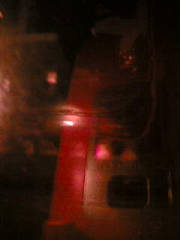|
Japan and electronic culture go hand-in-hand. It's evident in the technological inroads the country
has pursued since the 1950s; even more so in the strange
love-hate relationship expressed in films like 'Godzilla' and
'Mothra' right through to 'Gunhed' and 'Tetsuo: Iron Man'. Electronica shaped the soundtracks composed for these two most
recent films by Toshiyuki Honda and Kenji Kawai; there's the legacy of Yellow Magic Orchestra and Merzbow.
Contemporary
electronica and its disparate off-shoots have found a home in Tokyo, from Coldcut and the Ninja Tune posse through to Jeff
Mills and Hardfloor.
Then there's the home-grown fraternity. The litany of names as huge as it is diverse and talented.
Think Takkyu Ishino, Susumu Yakota, Co-Fusion, Ken Ishii, DJ Krush, Super Cozi, Dumb Type, Fantastic Plastic Machine, Otomo
Yoshihide. Now add Fumiya Tanaka to the equation. He's been called the Japanese answer to Jeff Mills by some short-sighted
journalists, but there's a lot more to the man behind both the decks and the Torema production line.
Given the comparisons
with Jeff Mills early on in his DJing career, and the prolific amount of records he's unleashed since 'Unknown Possibilities'
emerged a few
years back, it would be interesting to note just how different Fumiya Tanaka sees his DJing style of sound
from the music he makes. "What I enjoy most about
DJing is not so much choosing the records that I personally want to play,
but choosing ones that are suited to the mood of the room, to the general atmosphere, depending on factors such as how people
react," he says. "My recent album is based on the idea of the DJing mood; that sort of atmosphere. I see singles as part of
an overall sound, something that you play at a club to generate an overall mood. The club scene is very much to do with the
overall
atmosphere. An album is more."
Japan is hot right now for creativity across the spectrum, from techno to
experimental sounds. While he's best known as a DJ and a solo studio boffin,
Tanaka is keen to work with fellow Japanese
musicians. "Yes, I have done in the past and am keen to keep doing so in the future. Two years ago I made an album
with
various session musicians, not under my own name - it was more like a band situation. But I found it took a long time to get
the results I wanted because
Japanese session musicians are not particularly interested in creating, just in playing the
parts they've been given. In future, I'll probably try a different approach. I also play in a band, but we only get together
very occasionally. I'm keen to keep doing the band, but at the moment we don't have any concrete plans for the future."
Japan
is the home of manga and anime, and Ken Ishii paid homage to the mediums with his video for 'Extra' just a few years
back. Fumiya Tanaka sees it differently. "I'd have to say it's had next to zero influence [on my work]," he assesses. Japan
also had a strong industrial/experimental electronic scene in the '80s, but again Tanaka sees little influence upon his own
music. "I can't recollect much about that scene at all, actually - I mean, I was only a teenager in the
'80s, only just
starting to go out to clubs. And I was probably more interested in having fun than in listening to the music."
The
first release through Tanaka's label Torema was by Takehito Miyagi and Tamotsu Ide under the alias of Last Front, yet these
days most Torema releases are the owner's own. "Up until 1995 I was putting out other records from other artists, but then
I started making my own music and became more interested in
putting out my own music, to the point where it's now largely
my own label. I mean, I'd like to put out other music that interests me, but I find that a lot
of the time the artists
I like already have their own labels anyway. So for the moment it's only my staff. My other label, Untitled, started in 1996
- through
that I release what I guess you could call techno-inspired music, band music, including jazz - that isn't quite
techno or dance music as such. Does that make sense?"
He's lived and worked in both Osaka and Tokyo - what are the
main differences between the scenes in the two cities? "Population, firstly. There are heaps more
people out and about
in Tokyo, so you get more clubs and they're generally bigger. Osaka people are often more likely to get into your music."
His favourite DJs and producers? "There are lots of people I like, but in techno the person I would name in particular
would be Steve Bicknell." Tanaka has an
interesting career lined up if he ever stops DJing and making music. "It's hard
to imagine, because I've been making music as long as I can remember. I love doing
it. I guess if I was to be born again,
though, I'd like to be a highly skilled soccer player."

This article contributed by nobody you wanna know.
|

